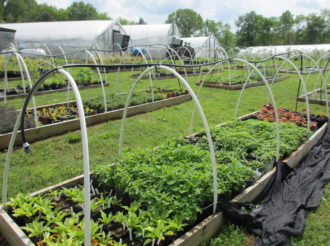GRIFFIN, Georgia -- The Southern region of the Sustainable Agriculture Research and Education (SARE) program has released its Call for Pre-proposals for the 2023 Research & Education Grants program. The deadline for submitting pre-proposals is June 3, 2022 at 12 p.m. (noon).
Note that this CFP is for the Research portion of the Research and Education Grant Program only. The Education Grant will be released at a later date in 2022.
New this year to the Research and Education Grant Program is a special topic on climate change. Specifically, of special interest are projects that explore new areas of inquiry surrounding reductions in greenhouse gas emissions including methane and nitrous oxide. Projects are sought that also explore incentives for farmers to reduce methane emissions and policies that provide incentives for climate-friendly agriculture commodities. Projects that explore the socioeconomic issues/indicators surrounding climate changes (including rural-urban climate change impacts, ethical health issues, consumer behavior and branding) are also encouraged.
Research and Education Grant pre-proposals focus on sustainable agriculture based on a systems approach to research, which aims to understand how the components of a system interact with each other and function as a whole. The central purpose of research proposals is research-based projects with an educational/outreach component involved to share project results. SSARE is looking for systems research pre-proposals of around $400,000, though smaller proposals are also welcomed.
Download the Call for Proposals to follow the guidelines for writing and submitting the grant application. The deadline for submitting pre-proposals is June 3, 2022 at 12 p.m. (noon). If selected, applicants will be invited to submit a full proposal in August. Grants will be announced in February of 2023. Projects begin April 1, 2023.
The objective of the SARE program is to enable farmers and ranchers to move profitably toward production systems compatible with the goal of sustainable agriculture, including promoting good land stewardship, protecting the health and safety of people and animals, enhancing quality of life, and strengthening rural communities.
For more information on research and education projects, completed or ongoing, search the national SARE database.
For more information on Southern SARE, log on to http://www.southernsare.org.
Published by the Southern Region of the Sustainable Agriculture Research and Education (SARE) program. Funded by the USDA National Institute of Food and Agriculture (NIFA), Southern SARE operates under cooperative agreements with the University of Georgia, Fort Valley State University, and the Kerr Center for Sustainable Agriculture to offer competitive grants to advance sustainable agriculture in America's Southern region. This material is based upon work that is supported by the National Institute of Food and Agriculture, U.S. Department of Agriculture, through Southern Sustainable Agriculture Research and Education. USDA is an equal opportunity employer and service provider. Any opinions, findings, conclusions, or recommendations expressed in this publication are those of the author(s) and do not necessarily reflect the view of the U.S. Department of Agriculture.
